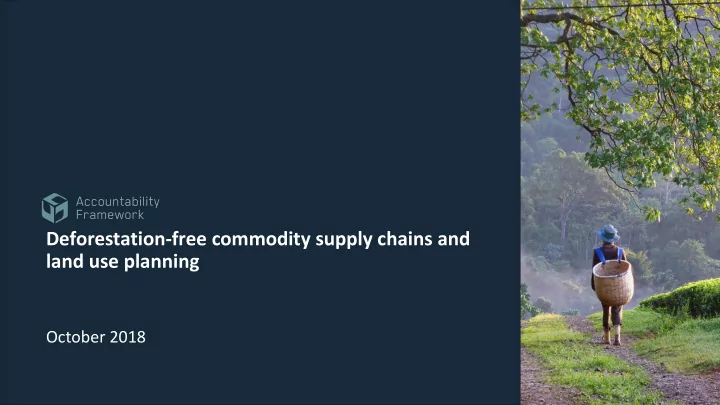

Deforestation-free commodity supply chains and land use planning October 2018
Overview • Highlight agreement among key actors of the importance of land use planning • Examples of challenges faced by companies due to lack of adequate land use planning • Perspectives on how planning exercises at national or subnational scales can support implementation of deforestation-free supply chain commitments.
Introduction Commodity production has been highlighted as a major driver of deforestation • and source of illegal timber in the tropics Many companies are now committed to the responsible sourcing and • production of agricultural and forest commodities such as palm oil, soy, sugar, pulp and paper, timber These commitments cover a range of issues including deforestation • 3
Deforestation is complex and challenging to address Addressing deforestation is complex and challenging • It is very location-specific with a variety of external and underlying drivers, • involving different actors and requiring different approaches to engage successfully A lot of deforestation is carried out by actors who are not yet producers or • suppliers 4
Policy processes, market signals and local context affect deforestation outcomes Land use planning can bring key actors together in dialogue to address the complex and multiple drivers of deforestation 5
Companies’ role in landuse planning Companies have a key role to play in land use planning in this sense, and the Accountability Framework’s Steering Group has developed specific guidance around this: The Framework’s Core Principles includes a section on land acquisition, land use planning and site development This section specifies that ‘companies conduct or support responsible practices in land acquisition, land use planning and site development, commensurate with their role in the value chain There are also opportunities to use company commitments to responsible, low deforestation commodity agriculture to support government initiatives including better legal compliance and improved governance 6
Example • Companies are using certification, HCV, HCS as well as their own guidelines or those of the CGF as tools to implement their commitment • But this is limited to the concession scale and often decisions are often challenged by contradictory government policy
Land use planning also supports delivery of company commitments Land use planning processes can support the implementation of company commitments by: Creating clarity on issues around ownership and rights to certain land areas, restriction or specification of certain uses of land, and other elements that companies need to include in their risk and impact assessments, due diligence and other planning processes Clarifying areas of conservation and community values in a land use plan also helps companies to make better decisions around how and where to set up operations Ensure that obligations associated with the acquisition of land are clear prior to company engagement Provide clarity on the relevant legal frameworks that companies need to follow when planning for development and sourcing in a specific landscape 8
Example • Ongoing work with national governments, state governments and local stakeholder platforms including land-use planning in the creation of regional principles and action plans to define responsible, low deforestation production for the region • APOI partner countries • Production landscapes in several countries (Nigeria, Liberia, Ghana, Cote d’Ivoire, etc.) accountability-framework.org 9
Conclusion and recommendation Deforestation is dynamic, heterogeneous and the result of different drivers in different contexts To effectively reduce deforestation in their supply base, supply chain companies need to among others engage in landscape and jurisdictional approaches that embed landuse planning processes Companies need to understand the local context and know how to work with relevant policy initiatives to increase alignment between market and policy signals and actions accountability-framework.org 10
Support for company engagement is crucial Effective delivery of zero- deforestation commitments by supply chain companies requires much more focus on practical guidance on how companies can support protection of forest on the ground and engage with land use planning processes 11
accountability-framework.org
Recommend
More recommend